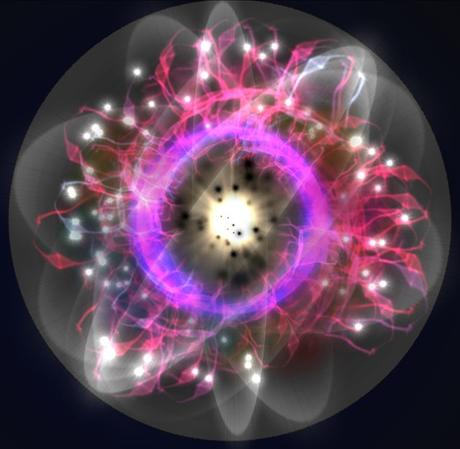
Continued from previous post
The scientific behaviors of electrons and photons have quite a bit to teach us about grace, also. The definition of grace is receiving a gift that you don’t deserve. The ultimate act of grace in Christianity, of course, being the sacrifice of Jesus Christ dying on the cross and paying for our sins to give us the gift of eternal life (I was so good at presenting the gospel at one time).
Beyond that major milestone of the cross, however, grace is also available throughout our days in many other ways. Sometimes grace can be blatant and obvious, like when we get those wonderful klunks on the head where God swoops in and saves the day, even though we never really asked for it: the deal closes just in the nick of time; we miss the accident by seconds; the illness heals; disaster is averted. In those cases, we might be more likely to recognize and thank God for it.
But I think more often God is showing up in the little things throughout the day — the clever surprises and good tidings and sighs of relief; things that we may even take for granted. God’s grace is potentially available everywhere in our lives, but just like the electrons deciding to show up in one place or another, we have to decide to look. And when we do, then it turns out to be the right place.
The basic idea behind grace is that it is an undeserved showing of love from God. He reaches out to us, to show us His love, every day. That is, I believe, how God actually intervenes in our lives: through this slippery, lovely thing called grace. But to truly benefit from grace, we have to be aware, and we have to notice, and we have to be willing to accept it.
It seems to me that grace is built right into the physics of our universe, in the particles and molecules that are the very basic building blocks of our lives: in each person and conversation we have; our family; our workplace; our house; our car; our office; the songs that play when I hit random shuffle on my I-pod. We are all bopping along in our lives, mostly unaware of the grace available to us at any time, but the probability is always there, in an infinite number of places. And once we start paying attention, actually becoming grateful, and giving in to the idea that His ways are higher than ours, then somehow, paradoxically, miraculously, our free will mingles with God’s unseen omniscient hand and God starts to reveal Himself in our lives. Because we noticed. Because we surrendered. Because we became thankful for what is in front of us. All we have to do is recognize that God’s potential is everywhere, all around us. And the odd thing is that when we do this, we start to grow and feel His purpose moving in our lives. For me, it feels like I am surfing on a wave of God’s intent for my life. The invisible momentum carries me, while I do the balancing and the surfing. We’re in it together, me and God. And I try not to wipe out.
I think we better get used to the possibility of two different, opposing, paradoxical ideas both existing together. Our universe is filled with contradictory, dichotomous, opposing facts that can both be completely true at the same time. We can’t possibly measure and categorize and split everything we think and know into these neat packages that always add up. Life is messy and gorgeous and heart-wrenching and utterly unpredictable, thanks to the sub atomic particles that keep us guessing all the time. But God is with us through it all, and he wants us to grow. He gives us little favors and hints and pieces of himself throughout our days. We just have to observe, see it before us and take it in, and then it will be so. It’s how He made the world. It’s built into the very fabric of our universe, as proven by the quantum physics.

